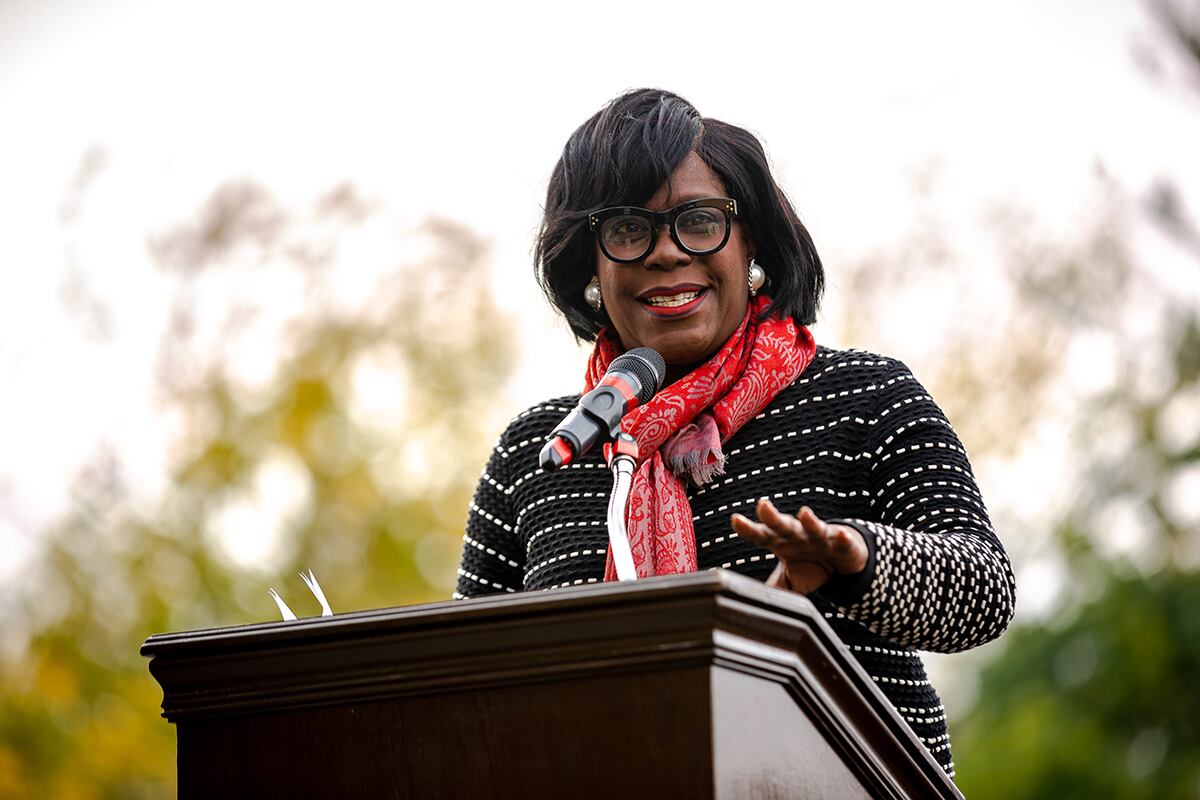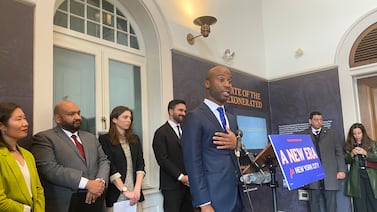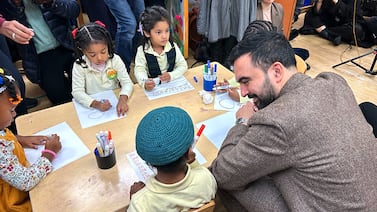If Philadelphia voters cast their ballots in line with their party registration this November, Democrat Cherelle Parker is all but guaranteed to become the city’s 100th mayor. She will also be the first woman, and the first Black woman, to hold the office.
Parker is a former City Council member and state representative who has a degree in education from Lincoln University and worked briefly as an English teacher in Pleasantville, NJ. She is running against Republican David Oh, an attorney who also used to be on the council.
The general election is Tuesday, Nov. 7, and the last day to vote early in person is Tuesday, Oct. 31.
The next mayor will have the responsibility of appointing the city Board of Education’s nine members, who in turn appoint and evaluate the superintendent, and monitor the district’s progress related to student achievement.
Parker’s campaign has already begun shaping education conversations in the city. Her pledge for “year-round school” was quickly picked up by Superintendent Tony Watlington, who incorporated a pilot program into his five-year strategic plan for the district.
Inspired by reader submissions, Chalkbeat asked both candidates to weigh in on the city’s most pressing education issues: school funding, safety, infrastructure, school board appointments, charter schools, and more. You can find Oh’s detailed Q and A here.
Here, Parker clarifies that for her, year-round school doesn’t mean more seat time in traditional classrooms, but vacation breaks spread throughout the calendar year and shortened during the summer, along with more enrichment activities for students. She also reiterates that she would favor putting more city funds into schools by increasing the district’s share of the city property tax, its largest source of local money.
She did not rule out creating more charter schools: “I want quality seats and I don’t care where they are,” she said, adding that she “will not allow anyone to act as if district-run and charter schools are warring factions.” Unlike Oh, she does not favor electing members of the school board.
This interview has been lightly edited for length and clarity.
Year-round school has been the centerpiece of your education platform. Tell us more how you envision that working.
When people heard me describe access to year-round school, I was not referring to our children sitting in a classroom at a desk, like we do during a traditional school day. But rather, it will … ensure that everyone has access to not just our traditional school curriculum, but academic enrichment programs, tutoring, homework help after school, and access to any workforce development and life skills opportunities that we could offer during out-of-school time.
Year-round education also references being innovative with scheduling. It doesn’t mean you don’t ever get time off. It could be two weeks here, two weeks here, three weeks here. All of our children … aren’t in the Hamptons or the shore all summer long. So for those children for whom those kinds of familial opportunities aren’t a part of their real lives, how do we structure our traditional school year in a way that makes good economic sense and is worth the educational investment for them?
Do you have any more specifics about how this would work and have you talked to the Philadelphia Federation of Teachers’ union about this?
The way I design things, they won’t be designed without the PFT, without our administrators, without our parents, without the external stakeholders, and subject matter experts all at the table figuring out, how do we make this work? … That has not been figured out, but that’s the purpose of putting out the concept. Stakeholders come together and we figure out a way to make it work. And that’s how I go about doing things.
Maybe some other people would love to be able to offer a plan and very specifically say, “This is how it’s going to work and this is what you’re going to do in a Parker administration.” That’s a recipe for disaster. This is a concept that I have in my mind. If I am the mayor, we are going to have year-round educational opportunities for our children. What does it specifically look like when it’s baked and done? I don’t have the specifics for you right now.
There is a basic foundation to public education, that we should in no way shape or form attempt to usurp. But I will tell you that it is in no way sufficient for everything that our children should be learning today.
The most direct power the mayor has over education in Philadelphia is by appointing the school board. Do you intend to replace any of the Board of Education members?
I am not going to make any comments or personnel decisions while I’m on the campaign trail. … I will be looking for people with a deep commitment to our city, the children of our city, and [who] share my vision for public education in this city.
Your opponent David Oh has talked about shifting to a partially elected school board. Is that something you would support or do you think the current model is working?
I will not and do not support an elected school board because if you elect a school board that comes with taxing authority … I trust the [city] council with the taxing authority for the city of Philadelphia. They are our legislative branch.
Who do you think would have access to the resources to run a citywide campaign to get elected to a school board? It would be those who are boosted by very special interests.
What is your position on charter schools? The Board of Education has not approved a new charter school since 2018, do you think that there should be more charter schools in Philadelphia?
I want quality, modern 21st education for all of our children [regardless of] their race, class, socioeconomic status, or zip code. I want quality seats and I don’t care where they are … Some people are not going to like it, but I’m going to unify educational institutions in the city of Philadelphia to work together to help our young people.
Under a Parker administration, I will not allow anyone to pit traditional publics versus traditional charters to act as if those two are warring factions. They are not. They are two types of schools that are both public that educate children in the school district of Philadelphia
I want to see our traditional publics, our traditional charters or parochial schools, and even the private schools — I want to see the leadership all coming together to say this is what we’re doing. Is there a way as educational leaders … that we can add value to each other’s delivery of education? Can we leverage working together, and any supports or services that could benefit young people? Can we share or steal an idea?
I’m always looking to see what other cities and states and countries and nations are doing relative to public education … we haven’t thought big enough and broad enough because everybody’s so accustomed and comfortable working in silos, my mind doesn’t work that way.
Do you support Councilman Thomas’s proposal for a school building authority that would help the school district deal with flaking asbestos and other issues relating to safety and modernization of its buildings?
Let’s think about using apprentices and pre apprentices in the building trades and students in our school district to help be a part of that process. Do we do it via School Building Authority, an accelerated process within our current structure? I’m not sure. I’m not wedded to any way, I’m actually still right now reviewing what that means.
I’m more concerned with getting it done. We have to get together at the table, agree to what the plan will be. And then we have to be unified in our advocacy and not trying to pick winners and losers with the ultimate goal being focused on our children and doing right by the people who work in those buildings.
How do you expect to pay for some of the big policy ideas you’ve put forward?
I would be open to exploring increasing the school district’s portion of our property taxes from 55%, potentially to 58%. And that would add an additional $50 million in additional revenue.
That couldn’t be done alone. You have to have an intergovernmental strategy that’s state, local, and federal. You also need the philanthropic community, you need the business community. We cannot try to address these issues in silos that we’ve got to bring people together to say this is the plan, this is what we need from you and you and you and how are we going to work together in order to make it happen?
Our district is historically underfunded, we get it. The court case [ruling Pennsylvania’s school funding system unconstitutional] is extremely important, and potentially increasing our school district’s portion of our property taxes, but we also have to be demonstrating that we’re trying to do things differently here. People are not going to talk about providing additional support and funding to the school district until they see us trying to do something different [in the city.].
Gun violence is also a major issue affecting students, educators, and school communities. What are your proposals for improving school safety?
I welcome everyone to take a look at my comprehensive neighborhood safety community policing plan … we have to make public health and public safety the number one priority here in the city of Philadelphia, and we should do it with three primary buckets in mind, prevention, intervention and enforcement.
We cannot talk about [education] without talking about trauma, mental and behavioral health support. We can’t talk about public education without the need for nurses and counselors and therapy for our children. A holistic approach to delivering public education helps us with public safety.
How does policing fit into that?
We are going to have community policing in every neighborhood in the city of Philadelphia. The only time we see law enforcement won’t be because it’s a crisis and someone called 911. They will be a part of the very fabric of our neighborhoods, and that, of course, does mean in and around our schools and buildings.
How can anyone shout we should be defunding the police when we should be focused on a holistic approach that does include community policing? … [We should] have officers who are not there as warriors but as guardians, working in partnership with our public safety office in the school district, with SEPTA and with other institutions so that we can have a holistic, comprehensive approach
I don’t apologize to anybody about making that a priority, because every child deserves to feel safe in school, and we should do everything that we possibly can to ensure it.
School was a lifeline for a person who grew up in poverty like me. … Every school should be a community school.
What’s your plan to address the teacher shortage and grow the teacher pipeline?
We’ve got to market it to them.
Philadelphia hasn’t done a good job in trying to package supports and services that we have available for example, with home ownership. We should be creative and incentivizing this … first we’re gonna make [Philadelphia] the safest, cleanest, greenest big city in the nation with economic opportunity for all and because it’s safe, we want you to have access to home ownership in a safe and a clean area with a thriving economy, thriving arts, culture, creative economy.
We’re going to see shortages across the board if we don’t find a way to use non-traditional strategies to market and encourage people to become residents of our great city.
Dale Mezzacappa is a senior writer for Chalkbeat Philadelphia, where she covers K-12 schools and early childhood education in Philadelphia. Contact Dale at dmezzacappa@chalkbeat.org.
Carly Sitrin is the bureau chief for Chalkbeat Philadelphia. Contact Carly at csitrin@chalkbeat.org.






